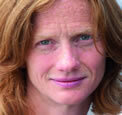You are viewing your 1 free article this month. Login to read more articles.
Betsy Tobin: Cockles of your heart
An evening in February 2004 claimed the lives of at least 21 cockle-pickers when they were drowned by an incoming tide on Morecambe Bay. A further two went missing, but their bodies were never discovered. Betsy Tobin's new novel, Crimson China (Short Books, October) imagines the life of one of those missing cockle-pickers.
The novel starts with a British woman, Angie, wading into the sea to commit suicide but she comes across Chinese cockle-picker Wen. Wen, now missing and presumed dead, returns home with Angie and continues life with her. In a parallel narrative six months later, Wen's twin Lili travels from China to Britain in search of her brother's memory. The story, however, takes a dark turn as Wen's past catches up with him.
Tobin says one of her original objectives was to write about the 1976 Tangshan earthquake but another terrible earthquake hit China during the course of her writing so she turned her focus to the Morecambe Bay tragedy.
The real life event "haunted her" and Tobin explains she has a "long-term interested involvement" in China. She spent a year of her student life in Beijing, speaks Mandarin and is a regular visitor to the country and she says her knowledge of the country "underpins" the whole book.
The novel sits at the juncture between two cultures, with the Chinese twins both immersed in English culture. "I think this is part of the book's appeal," says Tobin. "Not everyone would be prepared to read a book about a completely foreign place and culture, but we could all be Angie and be yanked out of our own culture through circumstance and find ourselves conducting a different way of life within our own culture. I think there's an appetite for that, I think people are interested in different sides of life they haven't come into contact with."
And the novel has certainly captured people's attention, with the title scheduled as Radio Four's "Book at Bedtime" in the final two weeks of October. "It seems to be a very topical book," says Tobin. "I've never had this sort of reception in advance of publication. It obviously has struck a chord."
Born in Ohio in 1961, Tobin lived in America until she was 27, working both as a social worker and for a consulting firm before completing an MFA (Master of Fine Arts) in creative writing. Tobin moved to England in 1989 as her husband was keen to return to his native country. "I felt [England] was a better place for a writer. I think of America as a picture-oriented culture, it is very much geared towards the image... I think of this culture as much more word oriented."
Tobin worked as a journalist at Broadcast magazine before turning her hand to fiction, but says she wasn't a very good reporter. "I was better at feature writing. I don't really have the temperament for news reportage, because there's too much of the mid-western in me, I can't write bad stories about people."
When composing her debut, Bone House (2000) Tobin explains she didn't feel comfortable writing a contemporary British book having only lived in the country for 10 years, so solved this problem by setting her story in the distant past. Tobin adds: "I felt if I was writing about a historical time period I was putting myself on the same footing as my readers. Also I use research as a trigger for creativity and I can't imagine doing a book that wasn't backed up by a lot of research." Tobin says it's a "privilege" to have a job where she is still learning.
Crimson China is set in modern day England, whereas her three previous novels were based in historical and mythical times. However, she says: "Although you're not going back in time you're going to a completely different place... there's a little bit of exotic about it and there's a little bit of exotic in all of history as well."
Tobin is very mindful of her audience and is "incredibly conscious" on every page how she can make each line more interesting to the reader. Tobin says she does not compile index cards about her characters or claim to know what colour they would wear. "It's a much more organic thing," she explains. "They gradually come to life on the page and the voice often evolves. You arrive at a voice of your character and with that you arrive at a persona."
In whichever way Tobin's writing evolves in the future she is pretty certain she will never write about writing. "I have said to my husband if I ever write anything even vaguely about writing, take me out, shoot me, dismember me and bury me in the garden, because I really don't want to read about that."










